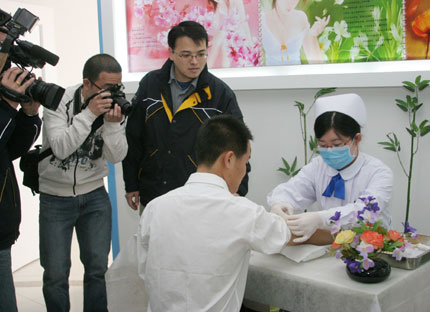Labor of love for AIDS activist
By Erin Zureick (chinadaily.com.cn)Updated: 2007-07-06 17:22
Covering the length of the wall from top to bottom, the map of Beijing's sprawling Chaoyang district has hundreds of locations marked as targets. Blue and yellow markers are for saunas and clubs. Red ribbons are for clinics.
Xiao, 31, who heads up the Chaoyang Chinese AIDS Volunteer Group, has been working for more than two years to improve AIDS education in China's capital. The organization's work is targeted at groups that are deemed a high risk to contract the deadly virus, such as intravenous drug users, sex workers and the city's gay population.
A gay activist, Xiao is particularly passionate about reaching these Beijing residents. He said he was motivated to start the volunteer group after several gay friends discovered they were HIV positive.
"Someone should take responsibility and stand out," he said.
Organizations like Xiao's are becoming increasingly common in Beijing as activists and government organizations seek to curb the threat of the virus. This spring the government launched its first AIDS education and prevention program aimed at channeling the efforts of gay organizations.
According to China's Ministry of Health, there are 117 grassroots organizations trying to prevent the spread of AIDS among Beijing's estimated 300,000 gay population. Gay men lead about 50 percent of these groups, the ministry reported.
"A community has to take care of itself," Xiao said. "If they do it themselves, it's more effective."
A Dual Challenge
One of the biggest challenges facing AIDS activist groups is educating people about the risks of spreading the disease, while simultaneously trying to minimize the stigma associated with it.
That prejudice can be doubly painful for gay people in China, as they are already enveloped in a culture that discourages open acknowledgment of their sexual orientation. Many gays feel social pressure to marry and produce a child to continue the family name and do not want to disappoint their families.
"It takes time for parents of gay children to accept reality," professor Zhang Beichuan of Qingdao University's Medical School told China Daily in June.
A survey conducted by the Chinese Center for Disease Control and Prevention found that 18 percent of the homosexuals it polled were married, divorced or had children.
Those who marry but continue to engage in a gay lifestyle often increase their partners' chances of unwittingly contracting AIDS. According to Zhang's research, about 1.5 percent of sexually active homosexual men have the deadly virus. Few statistics exist on the prevalence levels among lesbians.
And while homosexuality was removed from the government's official list of mental disorders in 2001 - the same year the government openly acknowledged the country's AIDS crisis - the society is only slowly starting to open its arms to gays.
Xiao said he has received mixed responses from his friends since he started his volunteer organization. "I've been happy and lonely afterward," Xiao said, explaining that he gets personal satisfaction in helping others but that some friends refuse to associate with him because of his work.
China's response
The government estimates that about 650,000 people nationwide have AIDS. The World Health Organization has warned that the number could balloon up to 10 million by 2010 if significant measures aren't taken.
In response, the Chinese government introduced a five-year plan that sets goals for educating the public about AIDS, training health care workers and technicians, and delivering counseling to at-risk populations. Officials believe they can limit the number of HIV positive cases to 1.5 million by 2010.
But access to these education programs is still a huge issue. UNAIDS, the Joint United Nations Program on HIV/AIDS, reported that in 2006 prevention programs reached only 8 percent of men who have sex with men (MSM). That compares with 45 percent intravenous drug users and 25 percent of sex workers.
The Chaoyang Chinese AIDS Volunteer Group, in cooperation with the CDC, offers free counseling and tests for HIV. The typical cost for this is 1,500 RMB (US$197).
Volunteers also teach safe sex tips and recruit retired doctors needed for counseling and consulting. Those affected by AIDS can buy discount cards for medical treatments. For example, patients can get a 15 percent reduction on medical services at hospitals.
In the field
On a recent Saturday night at Destination, one of the hottest gay bars in Beijing, the lights were dim as couples lined the plush couches and bar stools, sipping mixed drinks and mingling.
On the club's crowded dance floor, Chinese men danced in a tangle of sweat as pop songs from artists like Nelly Furtado blasted from the speakers. Outside the club in Sanlitun, a long line of men gathered near the entrance.
According to data collected by the Chaoyang Chinese AIDS Volunteer Group, gays make more than 100,000 visits per month to gay bars, clubs and saunas, and these venues have become a focal point for safe sex education efforts.
Volunteers pass out packets of information each day at these gay venues - along with free condoms.
In June, 19 gay establishments in Beijing also began an AIDS education campaign, distributing free condoms and displaying AIDS awareness posters.
Xiao said the main challenges facing his organization in the immediate future are personnel and finance issues. So far, he's already sunk 150,000 RMB ($19,700) of his own savings into the operation.
"It is for the public interest," he said.
|
||
|
||
|
|

